用英语提建议的表达方式
- 格式:doc
- 大小:19.50 KB
- 文档页数:3
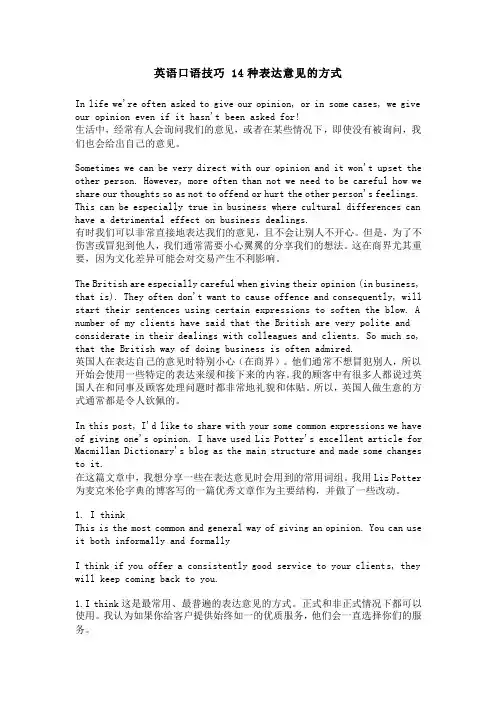
英语口语技巧 14种表达意见的方式In life we're often asked to give our opinion, or in some cases, we give our opinion even if it hasn't been asked for!生活中,经常有人会询问我们的意见,或者在某些情况下,即使没有被询问,我们也会给出自己的意见。
Sometimes we can be very direct with our opinion and it won't upset the other person. However, more often than not we need to be careful how we share our thoughts so as not to offend or hurt the other person's feelings. This can be especially true in business where cultural differences can have a detrimental effect on business dealings.有时我们可以非常直接地表达我们的意见,且不会让别人不开心。
但是,为了不伤害或冒犯到他人,我们通常需要小心翼翼的分享我们的想法。
这在商界尤其重要,因为文化差异可能会对交易产生不利影响。
The British are especially careful when giving their opinion (in business, that is). They often don't want to cause offence and consequently, will start their sentences using certain expressions to soften the blow. A number of my clients have said that the British are very polite and considerate in their dealings with colleagues and clients. So much so, that the British way of doing business is often admired.英国人在表达自己的意见时特别小心(在商界)。
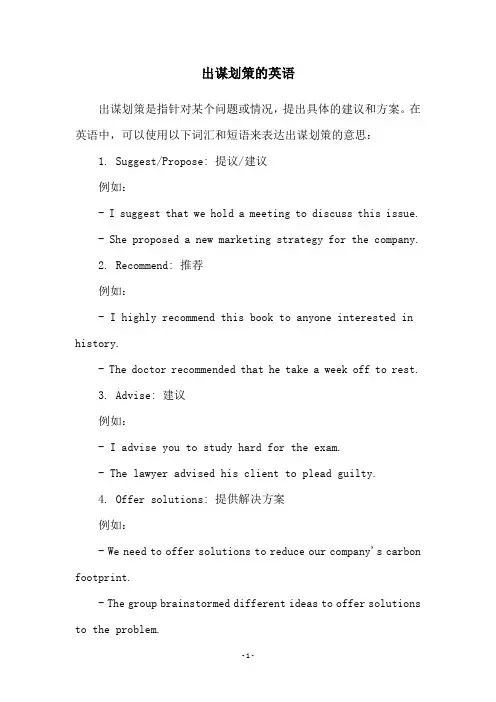
出谋划策的英语出谋划策是指针对某个问题或情况,提出具体的建议和方案。
在英语中,可以使用以下词汇和短语来表达出谋划策的意思:1. Suggest/Propose: 提议/建议例如:- I suggest that we hold a meeting to discuss this issue. - She proposed a new marketing strategy for the company.2. Recommend: 推荐例如:- I highly recommend this book to anyone interested in history.- The doctor recommended that he take a week off to rest.3. Advise: 建议例如:- I advise you to study hard for the exam.- The lawyer advised his client to plead guilty.4. Offer solutions: 提供解决方案例如:- We need to offer solutions to reduce our company's carbon footprint.- The group brainstormed different ideas to offer solutions to the problem.5. Give guidance: 给予指导例如:- Our teacher gave us guidance on how to write a good essay. - The counselor gave the students guidance on how to deal with stress.要想在英语中流利地出谋划策,需要掌握以上词汇和短语,并结合具体情景和语境使用。
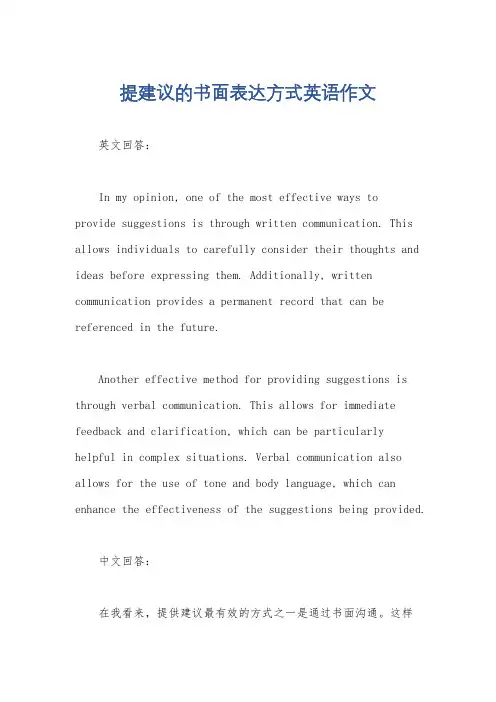
提建议的书面表达方式英语作文英文回答:In my opinion, one of the most effective ways toprovide suggestions is through written communication. This allows individuals to carefully consider their thoughts and ideas before expressing them. Additionally, written communication provides a permanent record that can be referenced in the future.Another effective method for providing suggestions is through verbal communication. This allows for immediate feedback and clarification, which can be particularlyhelpful in complex situations. Verbal communication also allows for the use of tone and body language, which can enhance the effectiveness of the suggestions being provided.中文回答:在我看来,提供建议最有效的方式之一是通过书面沟通。
这样可以让个人在表达之前仔细思考他们的想法和观点。
此外,书面沟通能够提供一个永久的记录,以便将来参考。
另一种有效的提供建议的方法是口头沟通。
这种方式可以获得即时的反馈和澄清,对于复杂情况特别有帮助。
口头沟通还可以利用语气和肢体语言,增强所提供建议的有效性。

英语建议信句型在我们学习英语的过程中,掌握建议信的相关句型是非常有用的。
无论是在考试中,还是在日常生活与他人的交流中,能够清晰、准确地给出建议,都能展现出我们良好的语言运用能力。
首先,让我们来看看建议信开头常用的句型。
当我们想要引起对方的注意并表明写信的目的时,可以这样说:“I'm writing to give you some suggestions on” 或者“I'm writing to offer you a few pieces of advice concerning” 。
比如说,“I'm writing to give you some suggestions on how to improve your English speaking skills” 这样的开头直接明了,让对方一下子就知道我们写信的意图。
在给出具体建议时,我们可以使用以下句型。
比如,“It would be a good idea if you” 像“It would be a good idea if you practiced speaking English with your frie nds every day” 这个句型语气比较委婉,让人更容易接受。
或者说,“Why don't you?” 例如,“Why don't you watch English movies to improve your listening comprehension?” 这种表达带有一种询问和引导的感觉。
还有,“You'd better” 比如,“You'd better make a study plan and stick to it” 不过需要注意,这个句型语气相对较强,使用时要根据具体情况斟酌。
另外,“If I were you, I would” 像“If I were you, I would read more English books to expand your vocabulary” 这个句型通过假设自己处于对方的位置,给出比较个性化的建议。
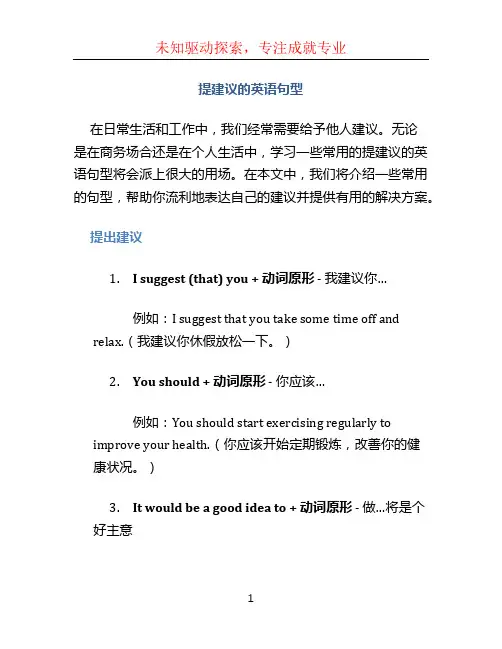
提建议的英语句型在日常生活和工作中,我们经常需要给予他人建议。
无论是在商务场合还是在个人生活中,学习一些常用的提建议的英语句型将会派上很大的用场。
在本文中,我们将介绍一些常用的句型,帮助你流利地表达自己的建议并提供有用的解决方案。
提出建议1.I suggest (that) you + 动词原形 - 我建议你…例如:I suggest that you take some time off and relax.(我建议你休假放松一下。
)2.You should + 动词原形 - 你应该…例如:You should start exercising regularly to improve your health.(你应该开始定期锻炼,改善你的健康状况。
)3.It would be a good idea to + 动词原形 - 做…将是个好主意例如:It would be a good idea to save money for emergencies.(存钱以应对紧急情况将是个好主意。
)4.Have you considered + 动词-ing - 你有没有考虑过…例如:Have you considered joining a language exchange program to improve your English?(你有没有考虑过参加语言交流项目来提高英语水平?)5.Why don’t you + 动词原形 - 你为什么不…例如:Why don’t you try taking up a new hobby? It could be a great way to relax.(你为什么不尝试一下新的爱好?这可能是个放松的好方式。
)提供解决方案1.One possible solution would be + 动词-ing - 一个可能的解决方案是…例如:One possible solution would be setting clear goals and priorities.(一个可能的解决方案是设定明确的目标和优先级。

英语中的“请求许可”与“提出建议”作者:杨灵微来源:《初中生之友·中旬刊》2014年第04期英语中,我们可以用多种方式来表达请求许可、提出建议或是征求对方的意见。
下面我们就来一起学习一下“请求许可”与“提出建议”在英语中的一些常见的表达方式。
一、may表示“许可、准许、请求许可”,此时与can同义,可以互换使用。
例如:May/ Can I come in? 我可以进来吗?You may/ can go to the cinema this evening. 你今晚可以去看电影。
【温馨提示】对方许可时, 其答语可以用Yes, you may. 但由于用may作肯定回答,语气显得生硬、严肃,因而一般常用Yes, please./ Certainly./ Of course.等。
这些肯定答语显得热情、客气。
例如:—May I use your sharpener?——我可以用你的卷笔刀吗?—Certainly. Here you are. ——当然可以,给你。
若对方拒绝时,其答语可以用No, you may not./ No, you mustn’t./ No, you can’t.或Sorry, you can’t./ No, please don’t.等较委婉、客气的说法。
例如:—May I go out for a walk after supper, Mum?——妈妈,我晚饭后可以出去散步吗?—No, you can’t. ——不,你不可以。
—May I watch TV on Sunday evening?——我可以在星期天晚上看电视吗?—No, you mustn’t. ——不,你星期天晚上不准看电视。
二、can/ could表示请求和许可时,意为“可以”,这一用法中,can和could均表示现在,但在语气上could比can委婉、客气。
句式Can (Could) I/ We...?常用来表示要求或允许;句式Can (Could) you...?常用来表示请求。
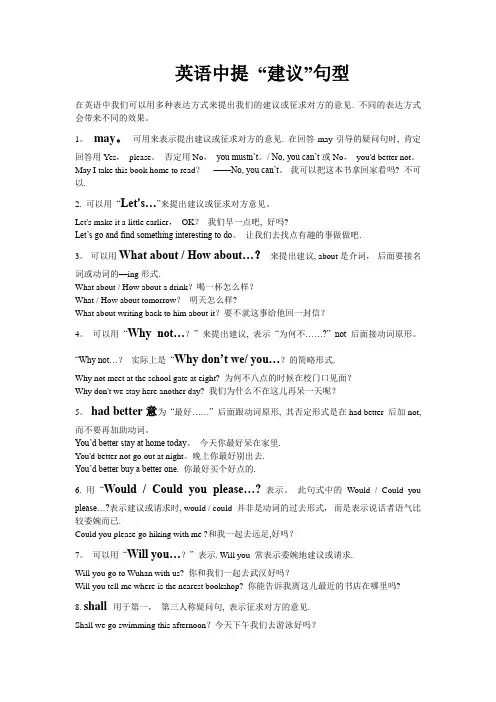
英语中提“建议”句型在英语中我们可以用多种表达方式来提出我们的建议或征求对方的意见. 不同的表达方式会带来不同的效果。
1。
may。
可用来表示提出建议或征求对方的意见. 在回答may引导的疑问句时, 肯定回答用Yes,please。
否定用No,you mustn’t。
/ No, you can’t或No,you'd better not。
May I take this book home to read?-——No, you can’t。
我可以把这本书拿回家看吗? 不可以.2. 可以用“Let's…”来提出建议或征求对方意见。
Let's make it a little earlier,OK?我们早一点吧, 好吗?Let’s go and find something interesting to do。
让我们去找点有趣的事做做吧.3。
可以用What about / How about…?来提出建议, about是介词,后面要接名词或动词的—ing形式.What about / How about a drink?喝一杯怎么样?What / How about tomorrow?明天怎么样?What about writing back to him about it?要不就这事给他回一封信?4。
可以用“Why not…?” 来提出建议, 表示“为何不……?” not 后面接动词原形。
“Why not…?实际上是“Why don’t we/ you…?的简略形式.Why not meet at the school gate at eight? 为何不八点的时候在校门口见面?Why don't we stay here another day? 我们为什么不在这儿再呆一天呢?5。
had better意为“最好……” 后面跟动词原形, 其否定形式是在had better 后加not, 而不要再加助动词。

用英语提建议的八种方式用Shall we...?在表示建议或征求对方意见时,可用以Shall开头的一般疑问句。
其肯定回答一般可用:All right;OK;Good idea等。
用Let's...?表示"让我们"(包括双方在内)做某事"这一建议时要用以Let's 开头的祈使句。
而Let us在表示让我们做某事时,不包括对方在内。
如:Let's go and see the pandas. Let us go, will you?让我们去吧,好吗?用Why not...?Why not...?意思是:为什么不......?后接不带to的不定式(即动词原形)。
Why not...?是省略了主语的省略形式,完整句Why don't you/they/we...?如:Why don't you go with me? Why don't you try again?=Why not try again?用What about...?意为"......怎么"后可接名词、代词和动名词。
如:What about going out for a walk? I'm going to the park.What about you?用had better 意为"","还是......好",常用于口语,后接动词原形。
如:You had better stay at home. You'd better go now.用Don't...来表示建议,通常用于祈使句的否定形式中。
如:Don't play in the street. Don't throw it like that.Would you like+短语?这个句型意思是"......怎么样?"后接sth. 或to do sth.如:Would you like another cup of tea? Would you like some colour pencils?Will you please+动词原形......?它的意思是"请你......好吗?"如:Will you please come tomorrow? Will you please pick it up?。
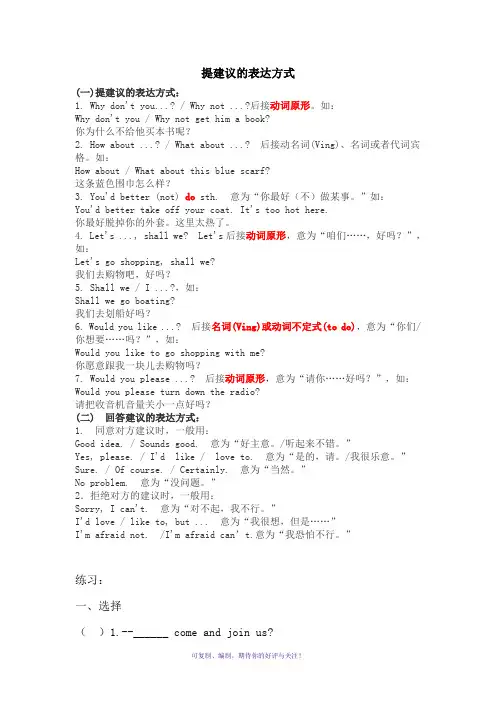
提建议的表达方式(一)提建议的表达方式:1. Why don't you...? / Why not ...?后接动词原形。
如:Why don't you / Why not get him a book?你为什么不给他买本书呢?2. How about ...? / What about ...? 后接动名词(Ving)、名词或者代词宾格。
如:How about / What about this blue scarf?这条蓝色围巾怎么样?3. You'd better (not) do sth. 意为“你最好(不)做某事。
”如:You'd better take off your coat. It's too hot here.你最好脱掉你的外套。
这里太热了。
4. Let's ..., shall we? Let's后接动词原形,意为“咱们……,好吗?”,如:Let's go shopping, shall we?我们去购物吧,好吗?5. Shall we / I ...?,如:Shall we go boating?我们去划船好吗?6. Would you like ...? 后接名词(Ving)或动词不定式(to do),意为“你们/你想要……吗?”,如:Would you like to go shopping with me?你愿意跟我一块儿去购物吗?7. Would you please ...? 后接动词原形,意为“请你……好吗?”,如:Would you please turn down the radio?请把收音机音量关小一点好吗?(二) 回答建议的表达方式:1. 同意对方建议时,一般用:Good idea. / Sounds good. 意为“好主意。
/听起来不错。
”Yes, please. / I'd like / love to. 意为“是的,请。

suggestion 英文建议在我们的日常生活中,建议和提议是非常常见的,特别是在需要改善某种情况或解决特定问题时。
在商业、教育、医疗和许多其他领域,建议都起着至关重要的作用。
这篇文章将探讨suggestion的英文建议,包括其定义、使用场景、表达方式以及如何提出有效的建议。
一、Suggestion的定义在英语中,suggestion是指一种建议、提议或意见,通常用于描述某种可能的解决方案或改进措施。
它是由一个人或团体向另一个人或团体提出,以帮助他们改善或解决问题。
建议通常是一个主观性的意见,它的接受与否取决于提出者和接受者的判断和决策。
二、使用场景建议在各种场景中都有可能出现。
例如,在商业中,公司可能会向潜在的客户或投资者提出某种商业建议,以吸引他们的注意或获得更多的业务机会。
在教育领域,教师可能会针对学生的学习问题提出具体的建议。
在医疗领域,医生可能会针对病人的健康问题提出治疗建议。
此外,建议也经常出现在日常生活中的各种交流和对话中。
三、表达方式在英语中,建议通常通过陈述句或疑问句来表达。
当提出者希望接受者接受某个建议时,他们通常会使用陈述句来表达。
例如,“我建议你应该在面试前做好充分的准备。
”当提出者不确定接受者是否接受某个建议时,他们通常会使用疑问句来表达。
例如,“你介意我明天再来拜访你吗?”四、如何提出有效的建议提出有效的建议需要以下技巧:1. 明确目标:在提出建议之前,提出者需要明确自己希望达到的目标或解决的具体问题。
只有明确了目标,才能使建议更加有针对性。
2. 了解接受者:了解接受者的需求、兴趣和背景信息是提出有效建议的关键。
只有了解接受者的需求和兴趣,才能使建议更加符合他们的期望。
3. 提供解决方案:提出者需要提供一个或多个具体的解决方案。
这些解决方案应该是基于提出者的经验、知识和观察力得出的。
4. 以积极的方式表达:提出者应该以积极的方式来表达自己的建议。
这可以通过使用鼓励性语言、强调潜在的益处或后果等方式来实现。
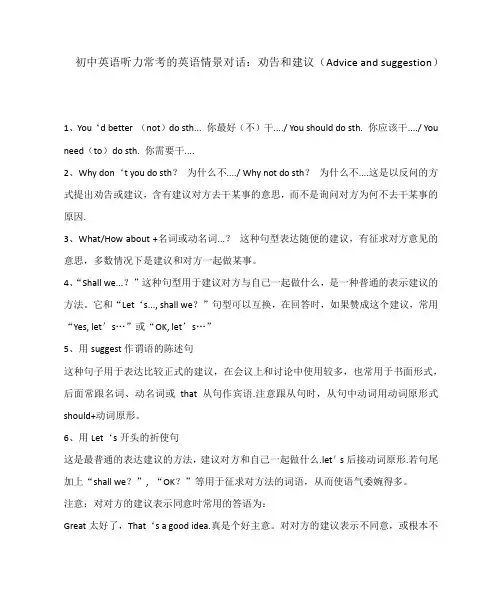
初中英语听力常考的英语情景对话:劝告和建议(Advice and suggestion)
1、You‘d better (not)do sth... 你最好(不)干..../ You should do sth. 你应该干..../ You need(to)do sth. 你需要干....
2、Why don‘t you do sth?为什么不..../ Why not do sth?为什么不....这是以反问的方式提出劝告或建议,含有建议对方去干某事的意思,而不是询问对方为何不去干某事的原因.
3、What/How about +名词或动名词...?这种句型表达随便的建议,有征求对方意见的意思,多数情况下是建议和对方一起做某事。
4、“Shall we...?”这种句型用于建议对方与自己一起做什么,是一种普通的表示建议的方法。
它和“Let‘s..., shall we?”句型可以互换,在回答时,如果赞成这个建议,常用“Yes, let's…”或“OK, let’s…”
5、用suggest作谓语的陈述句
这种句子用于表达比较正式的建议,在会议上和讨论中使用较多,也常用于书面形式,后面常跟名词、动名词或that从句作宾语.注意跟从句时,从句中动词用动词原形式should+动词原形。
6、用Let‘s开头的祈使句
这是最普通的表达建议的方法,建议对方和自己一起做什么.let's后接动词原形.若句尾加上“shall we?”, “OK?”等用于征求对方法的词语,从而使语气委婉得多。
注意:对对方的建议表示同意时常用的答语为:
Great太好了,That‘s a good idea.真是个好主意。
对对方的建议表示不同意,或根本不。
lets和let us的用法一、认识"let's"和"let us"在日常英语交流中,我们经常会遇到两个非常相似的短语:"let's"和"let us"。
这两个短语都有着相同的基本含义,即表示邀请或提议,但在使用上存在一些细微的差别。
在本文中,我们将详细了解这两个表达方式的用法及区别。
二、"let's"的用法"Let's"是由单词 "Let"(让) 和无生殖器官 's 组成的合成缩写形式。
它是一种口语化和非正式化表达方式,并且通常只用于第一人称复数(we 或us)意义下。
"Let's"主要被用于提出建议、邀请或共同行动等情况下:Example 1: Let's go to the movies tonight.(让我们今晚去看电影吧。
)Example2: Let’s have a party at my place tomorrow.(明天我们在我家开个派对吧!)备注: 在以上例句中, "let’s” 表示提议或邀请并且暗示了跟说话人有关系的对象。
三、“let us”的用法“Let us” 源自于 Old English 的 letan 短语,在早期英语书写中较为常见。
与“let's”相比,“let us”更正式,并可以用于任何人称、单数或复数形式的表达。
因此,"let us"可以指示任何受众来进行某种活动。
Example 3: Let us consider the consequences of our actions.(让我们考虑一下我们行为的后果吧。
)Example 4: Let us pray for those in need.(让我们为那些需要帮助的人祈祷吧。
can’t be too的用法在英语中,“can’t be too” 是一个非常常用的表达方式,意为”不能太……“,用来强调某种情况或建议。
它可以用在各种语境中,使语言表达更加生动且具有说服力。
接下来,我们将探讨一些常见的用法以及例句。
1. 表示建议在给他人建议时,“can’t be too” 可以用来强调某种做法的重要性。
比如:•你在准备面试时,不能太慌张,最好提前做好准备。
•学习外语时,不能太急功近利,多花时间练习听力会更有效果。
•提醒孩子,不能太迟睡,保持良好的作息可以有助于身体健康。
2. 表示忠告当我们想给他人一些建议或忠告时,“can’t be too” 也能够很好地体现出我们的关心和建议。
比如:•对于长期工作在电脑前的人来说,保护眼睛很重要,不能太忽视。
•节假日外出旅行,注意安全第一,不能太大意。
•在人生的道路上,坚持梦想很重要,不能太容易放弃。
3. 表示强调有时候我们想强调某种做法或态度是十分必要的,这时用”can’t be too” 可以使语气更加肯定。
比如:•健康饮食对身体很重要,不能太随意。
•感恩的心态能够使人更快乐,不能太忽视。
•爱护环境是每个人的责任,不能太漠视。
4. 表示警示有时候我们需要提醒他人注意某种不良行为或习惯,“can’t be too” 可用来警示。
比如:•过度消费会让人陷入经济困境,不能太任性。
•交通安全很重要,不能太操之过急。
•网络安全意识要提高,不能太大意泄露个人信息。
通过以上的例句和用法解释,我们可以发现“can’t be too” 是一个极具灵活性和实用性的短语,可以用来表达各种情况下的建议、忠告、强调和警示。
在英语写作和口语表达中,加入这个短语会使语言更富有表现力,让语言表达更加生动。
希望大家能够灵活运用这一表达方式,使自己的语言更加精彩生动!。
you had better用法"You had better" 是英语中的一个常用的表达方式,通常用来提出建议或警告。
它的用法如下:1. 基本结构: "You had better + 动词原形 + 其他部分"。
例如: "You had better finish your homework before the deadline."2. 语气: "You had better" 通常用于较为正式或严肃的语境,表示一种强烈的建议或警告。
它的语气比 "You should" 或 "You might as well" 更强烈。
3. 与时间相关的含义: "had better" 也可以表示 "早该"。
例如: "You had better start now if you want to finish by noon." 4. 否定形式: "had better" 的否定形式是 "had better not"。
例如: "You had better not tell anyone about this."5. 与虚拟语气的结合: "had better" 也可以与虚拟语气结合使用,表示与事实相反的情况。
例如: "If I had known that, I would have better prepared."6. 与其他表达方式的比较: "had better" 与 "should" 或 "must" 在某些情况下可以互换使用,但 "had better" 的语气更为强烈。
提建议的表达方式(一)提建议的表达方式:1. Why don't you... / Why not ...后接动词原形。
如:Why don't you / Why not get him a book你为什么不给他买本书呢2. How about ... / What about ... 后接动名词(Ving)、名词或者代词宾格。
如:How about / What about this blue scarf这条蓝色围巾怎么样3. You'd better (not) do sth. 意为“你最好(不)做某事。
”如:You'd better take off your coat. It's too hot here.你最好脱掉你的外套。
这里太热了。
4. Let's ..., shall we Let's后接动词原形,意为“咱们……,好吗”,如:Let's go shopping, shall we我们去购物吧,好吗5. Shall we / I ...,如:Shall we go boating我们去划船好吗6. Would you like ... 后接名词(Ving)或动词不定式(to do),意为“你们/你想要……吗”,如:Would you like to go shopping with me你愿意跟我一块儿去购物吗7. Would you please ... 后接动词原形,意为“请你……好吗”,如:Would you please turn down the radio请把收音机音量关小一点好吗(二) 回答建议的表达方式:1. 同意对方建议时,一般用:Good idea. / Sounds good. 意为“好主意。
/听起来不错。
”Yes, please. / I'd like / love to. 意为“是的,请。
shall we的用法一、什么是“shall we”的用法?二、“shall we”的用适用场合1. 提议活动或行动的用法2. 征求对方意见的用法3. 表达礼貌和客套的用法三、“shall we”的相关表达方式1. “Shall we + 动词原形”2. “Shall I + 动词原形”3. “Shall + 主语 + 动词原形”四、“shall we”和其他提议方式的区别与比较五、总结一、什么是“shall we”的用法?在英语中,我们常使用“shall we”来提出建议、征求意见或发起邀请。
它可以被视为一种委婉而客套的表达方式。
无论是在正式场合还是日常交流中,“shall we”都是一种常见的应用。
在下面的内容中,我们将探讨关于“shall we”的正确使用方法及其适用场合。
二、“shall we”的适用场合1. 提议活动或行动的用法当你想邀请他人参加某项活动或共同进行某项行动时,使用“shall we”是非常合适的。
例如,在安排聚餐时,你可以说:“Shall we go out for dinner tonight?”这样既能表达出邀请的意图,也能给对方提供决策的机会。
2. 征求对方意见的用法在需要做出共同决策时,使用“shall we”可以很好地征求他人的意见。
比如,在商讨旅游计划时,你可以说:“Shall we visit the museum tomorrow afternoon?”这样可以展示你的主动性,并向对方传达你尊重其意见的态度。
3. 表达礼貌和客套的用法当你希望以一种礼貌而客套的方式提议或邀请时,“shall we”是一个合适的选择。
例如,当你想与他人交换联系方式时,可以说:“Shall we exchange phone numbers?”这种方式表达出了你温和而友好的态度,同时也不会给人压力感。
三、“shall we”的相关表达方式当使用“shall we”作为提议或邀请的开头时,请注意以下几种常见形式:1. “Shall we + 动词原形”这是最常见的用法形式。
如何表达你的建议英语作文英文回答:How to Express Your Suggestions.When you need to give advice or make suggestions, it's important to do so in a way that is clear, concise, and respectful. Here are some tips on how to express your suggestions effectively:Start with a positive statement. Instead of saying "You should do this," try something like "I think it would be helpful if you tried this."Be specific. Avoid vague suggestions like "You should change your attitude." Instead, be specific about what you want the person to do, such as "I think you should try to be more positive."Be respectful. Remember that you're giving advice tosomeone, not trying to tell them what to do. Use respectful language and avoid being judgmental.Be open to feedback. Once you've made your suggestion, be open to feedback from the other person. They may have a different perspective or experience that you haven't considered.Here are some examples of how to express your suggestions:"I think it would be helpful if you tried to be more positive.""Have you considered trying a different approach?""I think you should talk to someone about this.""Do you think it would be possible to compromise on this issue?"It's also important to be aware of the cultural contextwhen giving advice. What may be considered acceptable in one culture may be considered rude in another. For example, in some cultures, it's considered disrespectful to give unsolicited advice. It's always best to err on the side of caution and be respectful of the other person's culture.Here are some additional tips for giving advice:Be empathetic. Try to understand the other person's point of view before giving advice.Be supportive. Let the other person know that you're there for them and that you want to help.Be patient. It takes time for people to change. Don't expect the other person to follow your advice immediately.Giving advice can be a challenging task, but it's also an important one. By following these tips, you can increase the likelihood that your suggestions will be well-received and acted upon.中文回答:如何表达你的建议?当你需要给建议时,用一种清晰、简洁、尊重的方式表达非常重要。
提建议的表达方式
(一)提建议的表达方式:
1. Why don't you... / Why not ...后接动词原形。
如:
Why don't you / Why not get him a book
你为什么不给他买本书呢
2. How about ... / What about ... 后接动名词(Ving)、名词或者代词宾格。
如:How about / What about this blue scarf
这条蓝色围巾怎么样
3. You'd better (not) do sth. 意为“你最好(不)做某事。
”如:
You'd better take off your coat. It's too hot here.
【
你最好脱掉你的外套。
这里太热了。
4. Let's ..., shall we Let's后接动词原形,意为“咱们……,好吗”,如:
Let's go shopping, shall we
我们去购物吧,好吗
5. Shall we / I ...,如:
Shall we go boating
我们去划船好吗
6. Would you like ... 后接名词(Ving)或动词不定式(to do),意为“你们/你想要……吗”,如:
Would you like to go shopping with me
你愿意跟我一块儿去购物吗
~
7. Would you please ... 后接动词原形,意为“请你……好吗”,如:
Would you please turn down the radio
请把收音机音量关小一点好吗
(二) 回答建议的表达方式:
1. 同意对方建议时,一般用:
Good idea. / Sounds good. 意为“好主意。
/听起来不错。
”
Yes, please. / I'd like / love to. 意为“是的,请。
/我很乐意。
”
Sure. / Of course. / Certainly. 意为“当然。
”
No problem. 意为“没问题。
”
2.拒绝对方的建议时,一般用:
*
Sorry, I can't. 意为“对不起,我不行。
”
I'd love / like to, but ... 意为“我很想,但是……”
I'm afraid not. /I'm afraid can’t.意为“我恐怕不行。
”
练习:
一、选择
()come and join us
I have to meet my uncle at the airport.
not to;I think so not;I hope so don’t;I’m very tired not you;I like it
…
()about going swimming with me
--________,but I have a lot of homework to do.
A.I’d love to ,let’s go
,I won’t doesn’t matter
()about going out for a drink --__________.
A.It sounds good.
B. You may,if you like. ,I don’t mind. ’re welcome.
()you please _______ me around --______,I won’t.
A.don’t follow;No
B. not to follow;Sorry following;No follow;Sorry
…
()_____ ______ to the water park this weekend --Great.
A.don’t go go ’t you go
二、填空
1.Please join the line.=Could you please _____ _____ _____
2.Why don’ t we go for a picnic tomorrow
=Why _____ _____ for a picnic tomorrow
3.Shall we go to the cinema this afternoon
= _____ _____ to the cinema this afternoon.
= _____ _____ going to the cinema this afternoon.。